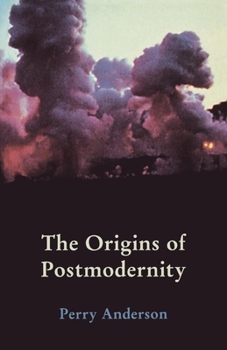The Origins of Postmodernity
Select Format
Select Condition 
Book Overview
Where does the idea of the postmodern come from? Who first conceived, and who developed it? How have its meanings changed? What purposes do they serve? These are the questions addressed in The Origins of Postmodernity . The answers take us from Lima to Angkor, to Paris and Munich, to China and the stars. At the center of the story is the figure of Fredric Jameson, theorist supreme of postmodernism. What happens to art, time, politics, in the age of the spectacle? What has ended, and what has begun?
Format:Paperback
Language:English
ISBN:1859842224
ISBN13:9781859842225
Release Date:September 1998
Publisher:Verso
Length:150 Pages
Weight:0.52 lbs.
Dimensions:0.5" x 5.4" x 8.5"
Customer Reviews
2 ratings
A survey of the subject as a whole and of Jameson's centrality
Published by Thriftbooks.com User , 18 years ago
This is a wonderfully concise and illuminative examination of the genesis and development of the contemporary debate concerning the postmodern, beginning with its earliest precursors, through its first contemporary uses in the seventies, through the major figures debating its meaning and significance, including Lyotard and Habermas, but especially Fredric Jameson. I have not read much in quite a while about the debates over the postmodern since reading some fifteen or so years ago works of Jencks, Habermas, Lyotard, and others on the concept. I did not read Jameson at that. Anderson has convinced me that I left out the crucial thinker on the topic. One thing that is infuriating if you read the major figures in the eighties debates over the postmodern (excluding Jameson) is that there is not quite agreement over what is being debated, what caused its development, and what its significance is. Both the force and sharp limitations of both Lyotard and Habermas's works are readily apparent. Jameson's work, on the contrary, is of a whole different magnitude. While Lyotard's book focuses primarily on the philosophy of science and Habermas's on trends in modern thought, Jameson uses the concept of the postmodern to illumine virtually every aspect of the contemporary world. Whereas for other thinkers the postmodern has been a movement within art or thought, for Jameson it is simply the stage the world has reached as conditioned by late capitalism. As Anderson writes near the end of the book: "Jameson construes the postmodern as that stage in capitalist development when culture becomes in effect coextensive with the economy" (p. 131). It is this economic dimension and the way it ties into globalism that is lacking in the accounts of the postmodern by the other theorists. Anderson makes a powerful case for Jameson as not merely as the foremost figure within late 20th-century Western Marxism, but as one of the great theoreticians of his age. Certainly he has made me want to read and study Jameson to a degree that did not previously.
THE BEST INTRO TO POSTMODERNISM
Published by Thriftbooks.com User , 21 years ago
"New Left Review" editor Perry Anderson is as erudite and engaging as ever in this short review of the varied conceptualizations of the postmodern. His chapter on the work of Fredric Jameson is bursting with intellectual energy. Anderson displays an almost boyish enthusiasm for Jameson's intellectual achievements that is quite infectious. If you have any interest in Jameson, Postmodernism, or the state of contemporary marxism, this book cannot possibly disappoint. Like the late Edward Said, Anderson possesses great literary gifts that make reading his books and articles a genuine pleasure.





